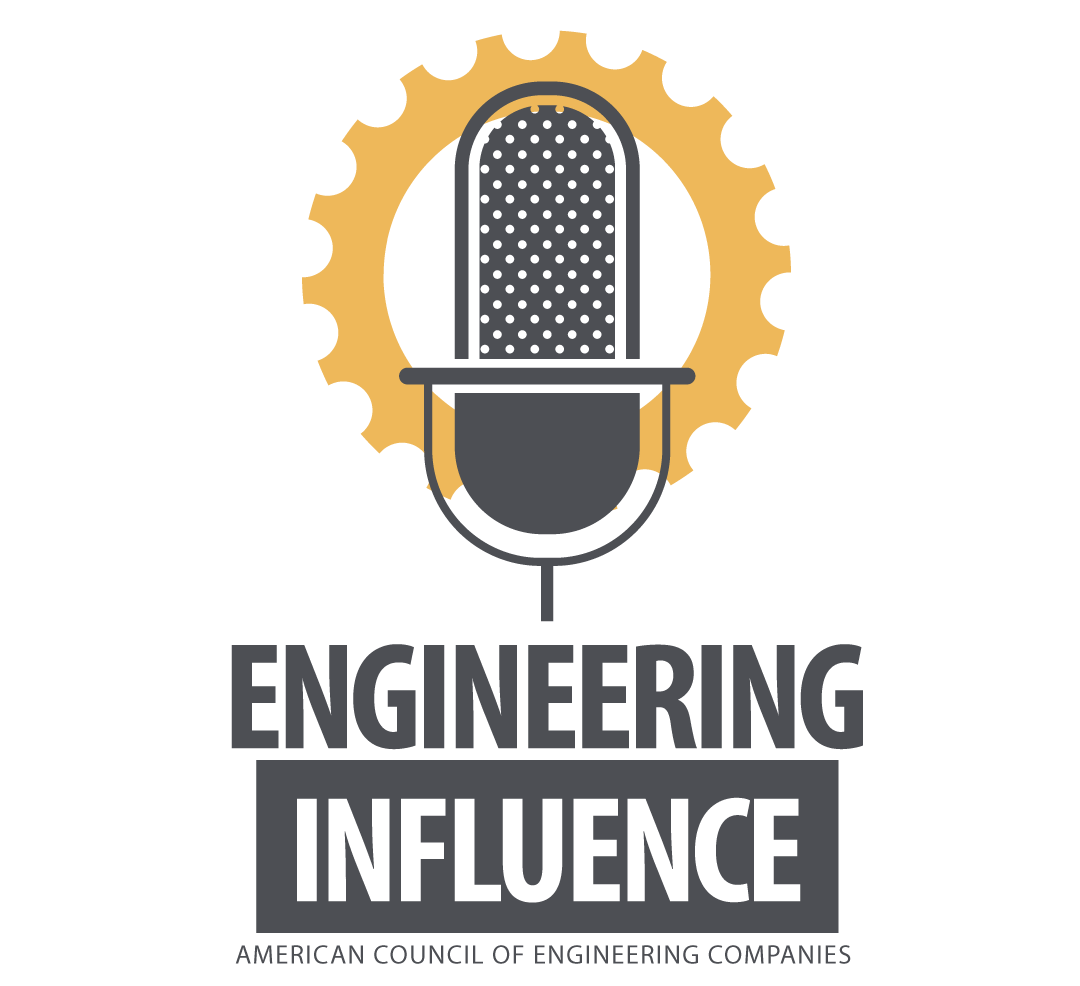
The Voice of the Business of Engineering
Engineering Influence is the official award-winning podcast of the American Council of Engineering Companies (ACEC).
ACEC is the trade association representing America's engineering firms; the businesses that design our built environment. Subscribe to the podcast for a variety of content ranging from interviews with newsmakers and elected officials to in-depth conversations on business trends, the economy, technology and what's next for the engineering and design services industry.
Visit us online at www.acec.org
Follow us on Twitter at @ACEC_National
ACEC reserves the right to moderate episodes on its channel and make editorial decisions on the inclusion or deletion of comments posted by listeners. Direct any questions to comms@acec.org.
Episodes
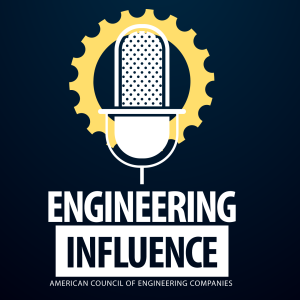
Friday Dec 17, 2021
Podcast Special: Reps. Don Bacon and Brian Fitzpatrick Discuss the IIJA
Friday Dec 17, 2021
Friday Dec 17, 2021
Congressman Don Bacon (NE-2) and Congressman Brian Fitzpatrick (PA-1) joined the program for a discussion about the Infrastructure Investment and Jobs Act and their votes that helped pass a generational investment in the built environment.
Transcript:
ACEC:
Welcome to the Engineering Influence podcast from the American Council of Engineering Companies. Today, I am very pleased to be bringing you two members of Congress who were instrumental in helping get the Infrastructure Investment and Jobs Act across the finish line. Congressman Don Bacon, representing Nebraska's Second Congressional District, and Congressman Brian Fitzpatrick, representing Pennsylvania's First Congressional District, join us today on the show. As a matter of introduction, Congressman Bacon was elected in 2016 and represents Nebraska's second congressional District. Now prior to serving in the House,, Congressman Bacon served as an officer in the Air Force, specializing in electronic warfare intelligence and reconnaissance. He served 16 assignments with the Air Force, including four deployments in the Middle East, including Operation Iraqi Freedom. He retired with the rank of Brigadier General and currently serves on the House Armed Services Committee and the House Agricultural Committee.
ACEC:
Congressman Brian Fitzpatrick represents Pennsylvania's First Congressional District. Prior to his election, he served as both an FBI special agent and as a federal prosecutor fighting both domestic and international political corruption and supporting global counter-terrorism and counter-intelligence efforts, including being embedded with U.S. Special Forces as part of Operation Iraqi Freedom. In the 117th Congress, Brian was elected co-chair of the bipartisan Problem Solvers Caucus, having previously served as the vice-chair. He is the ranking member on the House Foreign Affairs Subcommittee on Europe, Energy, the Environment, and Cyber, and was appointed by House Leadership to currently serve on the House Permanent Select Committee on Intelligence and as a Commissioner on the Commission on Security and Cooperation in Europe, also known as the U.S. Helsinki Commission. Additionally, Congressman Fitzpatrick serves on the House Transportation and Infrastructure Committee, a committee near and dear to our hearts. Thank you both for joining us today.
ACEC:
I'd like to start off, with Congressman Bacon first, and then Congressman Fitzpatrick. For our audience, who may not be well acquainted with Nebraska or Pennsylvania, can you tell us a little bit about your districts?
Congressman Bacon:
My district is Omaha and the south suburbs, so we have about 700,000 in about a county and a half, but it's really Omaha suburbs. In the next cycle, with redistricting, I gain another county. It's an urban/suburban community. It's one of the most purple districts in the country, officially R plus one. It's a railroad junction and an interstate junction, so it's very infrastructure intensive.
ACEC:
And Congressman Fitzpatrick. I have to admit full transparency. I am from Doylestown, Pennsylvania, so I am Bucks County all the way. Of course I remember it fondly as the Eighth Congressional District, but tell us a little bit about the First.
Congressman Fitzpatrick:
I didn't know you were from Doylestown, but I knew you're familiar with the area. So, the First District is the Philly suburbs. It's all Bucks County, which is the county just to the north of the city line of Philadelphia. The southern part of my district borders the city line of Philadelphia. The entire east side of my district borders, the river, crossing over into New Jersey. And then about 12 percent of my district is the adjacent county to the west Montgomery County. So I have sort of the central part, that's adjacent to Bucks County. Lke Don, we have about 740,000 constituents or so,. We're actually losing a district in Pennsylvania, going to 18 to 17, so my district will grow by about another 40,000 or so.,
ACEC:
Do you think you're going to grow west or north?
Congressman Fitzpatrick:
There are two maps. The House came out with a map that has me expanding my Montgomery county piece, and the State Senate came out with a map that has me picking up Northeast Philadelphia and also the northwestern part of Montgomery county. So two very different districts,
ACEC:
But two districts that were rely heavily on our infrastructure and the built environment. One of the things that I think is important to note here--and we hear it from our members, because I think that the way that this bill came to the floor and the way that House Leadership decided to tie the president's larger agenda together and to tie the infrastructure plan to Build Back Better--is that there's some misinformation out there that this is Build Back Better. It's not. This is a separate bill. This is hard infrastructure funding, that's both reauthorized funding and additional funding above that. There's some misunderstandings about the bill. What are the things you're hearing from your constituents that you really want to clarify, or misconceptions that you'd like to dispel?
Congressman Bacon:
I'll start off. Initially--and I think both Brian and I had this--we heard probably about 90 percent of the criticism was that it was a Build Back Better bill. Folks would say, "Hey, this bill passed amnesty for 11 million adults. You voted to support removing the Hyde Amendment and all the things that are in the Build Back Better bill." And I think we've done a pretty good job of poking that down. Another thing we heard was that only 10 percent of the bill is hard infrastructure, and that is not true. In fact, I've gone through it. I would say 94 percent of that bill is hard infrastructure. The rest of is doing toxic site cleanup on federal lands, which is also needed, by the way. And then we also heard this is a victory for Joe Biden. I think it's a victory for our country, a nd it could have been a victory for Republicans if our leadership would have responded more smartly, just to be blunt about it.
Congressman Bacon:
And I think the other area, which is more legitimate, is just worries about the deficit, and that's a legitimate area that we could go into. I have some perspectives on it, but those are the main areas of criticism, But early on, it was all Build Back Better. They are two totally separate bills, and which Brian and I both opposed. And in fact, Build Back Better has not passed yet out of the Senate, and it's probably going to be greatly changed by the time it does
ACEC:
Congressman, what are you hearing from your constituents in Pennsylvania?
Congressman Fitzpatrick:
Not surprisingly, all of us kind of heard the same thing. Don spelled it up perfectly. People confused and conflating the two different bills, which are two separate distinct bills. How anybody could argue that they're linked is beyond me. First of all, the Senate passed it on August 10th. House Leadership refused to put it on the floor because they weren't linking them, they were holding one hostage for another, and that's very different. But it passed and it's now signed into law, and the Build Back Better programs' fate remains very uncertain, at best. It has not been voted on. It has not been signed into law. A version was voted on in the House, which is dead on arrival in the Senate. That was more or less a messaging bill because reconciliation has to start in the House, so they just sent something over there to start the volley. But these bills are not linked.
Congressman Fitzpatrick:
In fact, I would submit to you, and you don't need to take my word for this, the moderate Democrat senators who are going to be outcome determinative in what, if any, passes the Senate with regard to reconciliation have told us that the passage of this bill actually will, in the worst case, lower the price tag significantly of the reconciliation bill, if not, obliterate it all together. So that's the reality. And yet there were so many people--and Don knows this--so many people who wanted to vote for this. The reason they didn't was because the politics wouldn't let them. And myself and Don and many of our other colleagues refused to allow politics to dictate how we vote. The easy thing to do would be to vote "No," and just go "Rah, rah, go party," right? That's not what we're about. We came here to help our country. And Don is absolutely right. If this would've been played the right way, this could have been a bipartisan victory altogether, but you can't make policy decisions based on who we win or loses politically. It's gotta be about whether America wins or loses. And if that bill came up tomorrow, I'd vote the same way.
Congressman Bacon:
Good policy is good politics. And our guys should have thought about that. I think in August, our team could have said, we want this bill on the floor right now, and we could have turned it to our advantage, but we, sort of ceded that. But in the end, infrastructure is needed for our GDP, exports, national security, public safety. and, as you mentioned, we haven't had a major investment in infrastructure in 40 years. And I'm the party of Lincoln? Also the party of the transcontinental railroad? And the party of Eisenhower, who did the interstate system? We should have embraced this.
ACEC:
That an important point to make. I mean, largely infrastructure investment has been a Republican core issue. It's constitutional, I remember when I was on TNI staff, we had that up there on the right side of the room, where in the Constitution on post roads, the constitutional underpinning for federal investment in infrastructure. And you're right, between the interstate highway system and the like, it's a core issue, and it was unfortunate to see it tied into this.
Congressman Fitzpatrick:
You hear a lot of talk about the big lie. I say the big lie this month was that only 11 percent of the infrastructure bill was real infrastructure. That is a provably false statement. Why anybody would say that, shame on them. Half of the bill, right off the bat, before we even get into the new parts, half of this bill was a standard five year surface transportation reauthorization, which sailed through the last Congress in 2016, when the GOP held the chamber. This has never been controversial. And the $550 billion supplemental, does so by recapturing unused COVID relief money, recapturing unused state unemployment insurance augmentation--that additional $300 a week that a lot of the state governors returned--and it doesn't open the tax code up at all. And just for comparison, we're talking about $550 billion additional over five years. China last year alone spent $3.7 trillion in infrastructure, outside of China. Outside of their country as part of the Belt and Road initiatives. So no matter how you want to slice this, we should all be focused in on the China issue. And look at it that way as well, because this is an investment in the nuts and bolts of our country.
ACEC:
You look at the numbers. Let's take Nebraska, for example. In the state, you have over 1,300 bridges and over 1,100 miles of highway in poor condition. You have commuting times going up across the country, Pennsylvania and Nebraska alike. You have money that's going to go specifically to improve surface infrastructure, that's going to improve people's lives, make it easier for economic development, open corridors for development, job opportunities, and growth. In our sector alone, we're looking at about 82,000 in direct employment, new jobs that will be created. And all the tax base that comes from that. If we don't invest in our surface infrastructure, we're we're pretty much shooting ourselves in the foot from a global competitive standpoint. During your discussions with your members and Congressman Fitzpatrick, I know you're part of the Problem Solvers Caucus, and you look at the issues. Did that resonate? Was there an understanding that this does actually create jobs and opportunity?
Congressman Bacon:
Absolutely. In our district, we have some of the largest trucking companies in the country. We also have the largest railroad company, Union Pacific. In other words, roads, bridges, railroads and very important.And we have the stuff for airports also in there, but I would also suggest that even the things that aren't part of Nebraska are still important for Nebraska. Ports and locks are very important for agriculture exports. We're one of the leading exporters for agriculture. Nebraska is the largest exporter of beef of all 50 states. It's very important to have good ports and locks for the agriculture sector.
Congressman Bacon:
As I look back, every major industry in Omaha supported this bill. The farm bureau were very much in support. The cattlemen. You had the Chamber, all the building trades were there. It's interesting to have unions and chamber together on this bill. The manufacturers were for it, the equipment operators and the equipment distributors. I can go through every major industry there, and they were supportive of this. But all of them, for the most part, maybe there were one or two exceptions, opposed the Build Back Better bill. So the business leaders and the economic folks, and the labor folks knew the importance of this bill for Nebraska and what means, and I mentioned to our leadership, you're asking us to oppose a bill that every major industry supports. I took two polls, in both around 70 percent of the citizens supported it. I said, we're on the wrong side of this issue.
ACEC:
Absolutely. And even the funding that's not directly to build roads or to restore bridges, such as resiliency and resilient infrastructure, those are things that also pay dividends into the future. I know anecdotally, you know, there are high rain events up in New York and that goes down the Delaware River and the eastern portion of Bucks County floods. And you have other issues, Congressman Bacon that you experience in Nebraska as well. If we're able to make our infrastructure, not only our surface infrastructure, but our communications and our electrical distribution systems, more resilient, and of course, resilient not just to weather events, but also for cybersecurity, we're going be more secure as a country.
Congressman Bacon:
Nebraska's rated 48th on rural broadband, so we'll benefit there. We have a lot of lead pipes, so the drinking water infrastructure part was also very important. And so literally these aspects of the bill are very important in Nebraska.
ACEC:
I think Nebraska is going to get an allocation of a hundred million dollars for rural broadband. That's a significant investment, especially now post COVID, it's not a luxury anymore. It's a requirement, not just for education, but for economic development,, and that's critically important, Pennsylvania, along the same lines, gets about one hundred million for broadband coverage across the state. There are about 394,000 Pennsylvanians who lack access to broadband, so connecting those people is going to be critically important. Congressman Fitzpatrick, I'll start with you. Is there a project in the district, or an area that you would really like to see improved, transportation-wise for your constituents?
Congressman Fitzpatrick:
Where do we begin? You know our region. The Northeast Corridor has the most infrastructure, the largest infrastructure and also the oldest infrastructure. We're heavily reliant on rail, on bridges, on tunnels, on ports. So certainly there's all of that. Obviously I-95 runs through our district. State routes, like 611, run through our district. But one that not many people realize, bit both me and my brother before me are very focused on the PFAS issue. There is a big PFAS remediation component to this. That's been a huge issue for the central part of our district, the area in and around, the Willow Grove Naval Air Station, where you had these AFFF firefighting foams that have PFAS and PFOA in it that have just wreaked havoc on the water supplies of so many people in that region. A big part of this bill finally addresses PFAS remediation, which was the big component of that problem. So the central part of our district is going to benefit tremendously from this.
ACEC:
Absolutely. That's been an issue for decades. And finally having that addressed is a significant real-life community improvement. It's going to impact people's lives, without question. Congressman Bacon, for your constituents, what do you see?
Congressman Bacon:
Well, our constituents are going to see benefits primarily in roads and bridges. As you said, we have 1,300 bridges that are in Nebraska, and some of those are right around Omaha. So the roads, the bridges, the rail, the airport funding is all going to have a direct impact. And of course for the rest of Nebraska, the rural broadband will be there. We have a lot of lead pipes in Omaha that we have to switch out. So there's 200 million to replace the lead pipes for drinking water. And that's also going be a big deal for our district.
Congressman Bacon:
But as already mentioned, I think more broadly, the ports and locks. They're not connected to Nebraska, but boy they're certainly connected to our economy. And I've got to give a lot of our folks back home this little tidbit on locks. Our locks are 80 to 90 years old. They're a third of the size of Brazil's that they're putting in right now. And we could grow corn and soybeans, beef and pork, more affordably than anybody else in the world, but if you can't ship it and get it to the right place for exports at a competitive price, you're gonna lose that competitive advantage.So if we want to lead the world in exports in these areas, our logistics have to be updated. And so I think more broadly that it's not just what's being put in our, district; it's our economy as a whole that's impacted.
ACEC:
That's a very good point that you raise. At the beginning of the month, we had a symposium down in Charleston on intermodal and logistics. Essentially dealing with all the supply chain pressures that we're having and experiencing now. The point you raise is a good one. When people of think of ports, you think, okay, you've got Long beach, you've got Charleston, and you have a couple of seaside ports. But you also have your inland ports. You have the importance of having a strong logistics system to actually move goods to market, so farmers in Nebraska can export out from areas on the East Coast. It's critically important. And it helps keep America competitive, and especially competitive in a fairly competitive global agriculture market. Congressman Fitzpatrick, you're a member of the Transportation and Infrastructure Committee. This was, of course, a major accomplishment on that side of the committee's jurisdiction. Coming up, I believe the committee might be considering another Water Resources Development Act bill. What do you see coming up from the committee?
Congressman Fitzpatrick:
Water is something that they wanted to take on separately for a whole host of reasons. I don't know where that's going to stand now that we just passed a major infrastructure rebuild, if this is gonna be what's next for them or not. I know for Congress as a whole, obviously there are some other things that they're focused on right now. I can tell you our Problem Solvers are very focused on issues regarding the Chinese communist party and issues regarding the semiconductor industry, which is incredibly important. If we fall behind in that industry, we've got major problems going forward. Whoever owns the semiconductor industry is going to own the future. And that's not just with regard to jobs. Literally everything we use is now computerized and digitized, including vehicles, including everything, and we used to produce 35 to 40 percent of the world's semiconductor supply. We're now at 12 percent; Europe is at 8 percent. Asia is 70 percent, and of that 70 percent, 30 percent is in Taiwan. So that's obviously one of the many reasons why we have to keep our eye on the situation over there. Our caucus met with Pat Gelsinger, the CEO of Intel, a great domestic semiconductor producer and manufacturer. And he's begging us, to just allow them to be competitive in this country, both through our tax code, our regulatory code and things like the CHIPS Act, where we're going to infuse and invest in that industry, given how important it is to our future. So that's what I see as coming up next.
ACEC:
And again there's always an infrastructure angle. When I was with Congressman Schuster back in the ninth district of Pennsylvania, right in the center of the state, we would say, you don't get economic development unless you flush a toilet. You're not going to attract a manufacturing base, unless there is the infrastructure. and not just the surface infrastructure to get employees to their work, but to get distribution there. That's what attracts it. So, if we're able to build out and make it easier for goods to get the market, we might be able to attract more domestic manufacturing and have that stay in the United States. But you're right, tied to that is a favorable regulatory and tax environment. Congressman Bacon, what do you see coming up coming up next?
Congressman Bacon:
On the infrastructure front, I'll defer to Brian on that, because he's on that committee. For me, I have a lot of infrastructure in the Hass that we have to continue working on. We have five bases that were destroyed through hurricanes or floods or earthquakes. So we're continuing to try to get these five bases back up to speed. So, that's our military infrastructure. But if you look at what we did with this bill, and I've looked at some studies, I think we only bought about half of what we needed to do. It's a good half, and we're gonna work that half and it's going to take four or five years to get this money spent. But we have to realize that we only paid off about half of what it's going to take to get our infrastructure back up to speed.
Congressman Bacon:
One of the studies I was looking at, and we have to be candid here--and Brian touched on this before--right now we're spending 2 percent of GDP on infrastructure. Europe is at 5 percent, and China is at 9 percent. I think we have to reevaluate how we're going to do this over the long haul. It shouldn't just be a four-year bill, and okay, now we've caught up. I think we probably need to readjust our baseline for what we need to be doing for infrastructure. If you look back over 40 years, for the first 20, we were sort of hanging even, but when you look at the last 20, the gas tax has not kept up with the costs. Inflation has eroded the gas tax revenues, but the roads have gotten more costly to fix. And so, over the last 20 years, we've fallen behind pretty quickly. And so I think we have to reevaluate. What do we want to do to keep up with our infrastructure? We shouldn't just say to put duct tape on it and fix it, but let's find a way to sustain it.
ACEC:
Absolutely. And then the growth of electric car market, of course that doesn't directly pay into the user fee. And you have to look at different innovative financing tools to do that.
Congressman Bacon:
Our miles-per-gallon used to be 15 miles per gallon or something. Now a lot of cars, especially with the hybrids it's double or triple that. And so we're bringing in a lot less gas revenue. And you're right, electrical cars are not paying in at all. And our roads and highways, in the meantime, are taking a beating. Amd our bridges. So we've got to figure out how to fix it.
ACEC:
It's a good thing that we have two good members of Congress who are actually going to be working on the problem, doing the problem solving, and moving good policy forward. And for that, we do appreciate both of your leadership,
Congressman Bacon:
Brian is our fearless leader on the Problem Solvers. He's Mr. Chairman.
Congressman Fitzpatrick:
And Don's our fearless leader on Main Street.
ACEC:
It's nice because we hear so much about discord and disagreement in Congress, but there are members who are focused on tackling the problems that we face and creating solutions. I think that what you mentioned at the outset, that good policy like this should carry a lot of other members to support it. So your leadership is a welcome thing these days.
Congressman Bacon:
If you read about Abraham Lincoln, he was a big follower of Henry Clay and Henry Clay wanted the American system, which was focused on waterways and roads. And they took a lot of heat from the other party. If you look at the arguments back then, they're almost the same now. Our country needs to be tied together well, and again, it's all about interstate commerce.
ACEC:
I do appreciate your time today. It's getting close to the Christmas season, and everybody's trying to get their last things done and votes in, so I do appreciate it. Thank you very much for supporting the legislation. Of course, the engineering industry is very interested in getting to work on delivering on the funding that's been passed in the bill. And I do appreciate both of your time today. Thank you. And again, this has been the Engineering Influence podcast from the American Council of Engineering Companies. We'll see you real soon.

Friday Dec 17, 2021
Revisiting ACEC‘s Project Management 101 Course
Friday Dec 17, 2021
Friday Dec 17, 2021
Registration is now open for the 7th session of Project Management 101 - the popular course focused on giving registrants the knowledge and tools necessary for successful project management at any level of their career.
To help announce the new session of the course, we're revisiting a conversation from August 2020 where we spoke with course instructor Howard Birnberg who discussed the new structure for the course and why it's important for engineering firm leaders at all levels.
Learn more and register for the course here: https://program.acec.org/pm101

Wednesday Dec 15, 2021
Ryan Suydam Talks About Differentiating Your Firm by Improving Your Client Experience
Wednesday Dec 15, 2021
Wednesday Dec 15, 2021
Ryan Suydam, the founder and Chief Experience Officer at Client Savvy, joined us on the program. Client Savvy works with professional services firms to understand how they are performing when it comes to their client expectations.
Click here to receive Client Savvy's One-Year Client Experience Plan.
Click here for information about the Client Experience online community and annual conference.
Click here for more information about Client Savvy.

Tuesday Dec 14, 2021
Tuesday Dec 14, 2021
Barritt Lovelace, Director of UAS/AI/Reality Modeling at Collins Engineers in St. Paul, MN, came on the program to talk about how his firm used drones, digital twins, and holograms to streamline its recent Stone Arch Bridge Rehabilitation project in Minneapolis.
Bentley Systems recognized the firm's achievements in its 2021 Going Digital in Infrastructure Awards, which honored projects from around the world that are pushing the envelope on digital solutions.

Friday Dec 10, 2021
Friday Dec 10, 2021
Hot off the heels of ACEC's first Private Market Symposium on Intermodal and Logistics, Erin McLaughlin joined the program to delve into the newly released Private Industry Brief on that market. Download your copy here: https://www.acec.org/publications/private-market-resources/
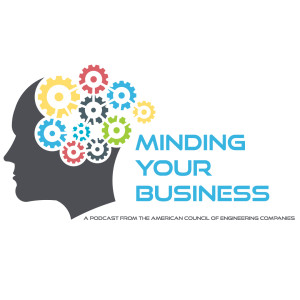
Thursday Dec 09, 2021
Thursday Dec 09, 2021
Labor shortage issues are big news, both on the national stage and within the design services industry. For design firms, these shortages are largely due to long-term declines in the number of STEM students as well as the need to attract a more diverse workforce.
In this episode, we dove a little deeper into the situation for firms in a key segment in the design services industry—surveying. Surveyors perform the initial fieldwork on civil engineering projects and they face some particular workforce constraints related to state licensing and other issues.
To talk about these issues, Joe Romano joined us on the program. Joe is a principal and Director of Surveying and Mapping at Langan, which is a 1,500-person consulting firm with offices worldwide. He is also the Chair of ACEC’s Coalition of Professional Surveyors (COPS).
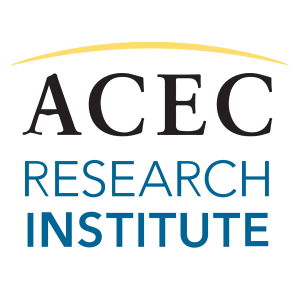
Monday Dec 06, 2021
Monday Dec 06, 2021
Ken McGill with Rockport Analytics joined the program to preview the newly updated Economic Assessment of the Engineering and Design Services Industry. This is the second annual release of the report, which measures the economic impact of the engineering and design industry and forecasts its growth over time.
On Wednesday, December 8th, the ACEC Research Institute will host a roundtable discussion which delves into the specifics of the report. The event, which is free to attend, will review the new five-year forecast, explore the impact of the Federal Stimulus programs and infrastructure bill, and also discuss insights from the Institute's new Engineering Business Sentiment study.
Register here for "Understanding Engineering's Future Impact on the U.S. Economy (a live roundtable)" on December 8th at 12:30pm.
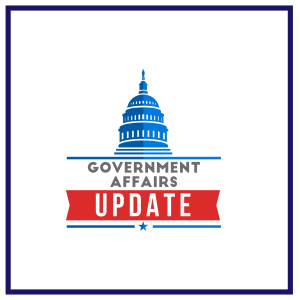
Friday Dec 03, 2021
Government Affairs Update for 12-3-21
Friday Dec 03, 2021
Friday Dec 03, 2021
Steve Hall joins the program to discuss the new ACEC action alert on the PPP FAR credits clause focused on Senate action on the National Defense Authorization Act.





